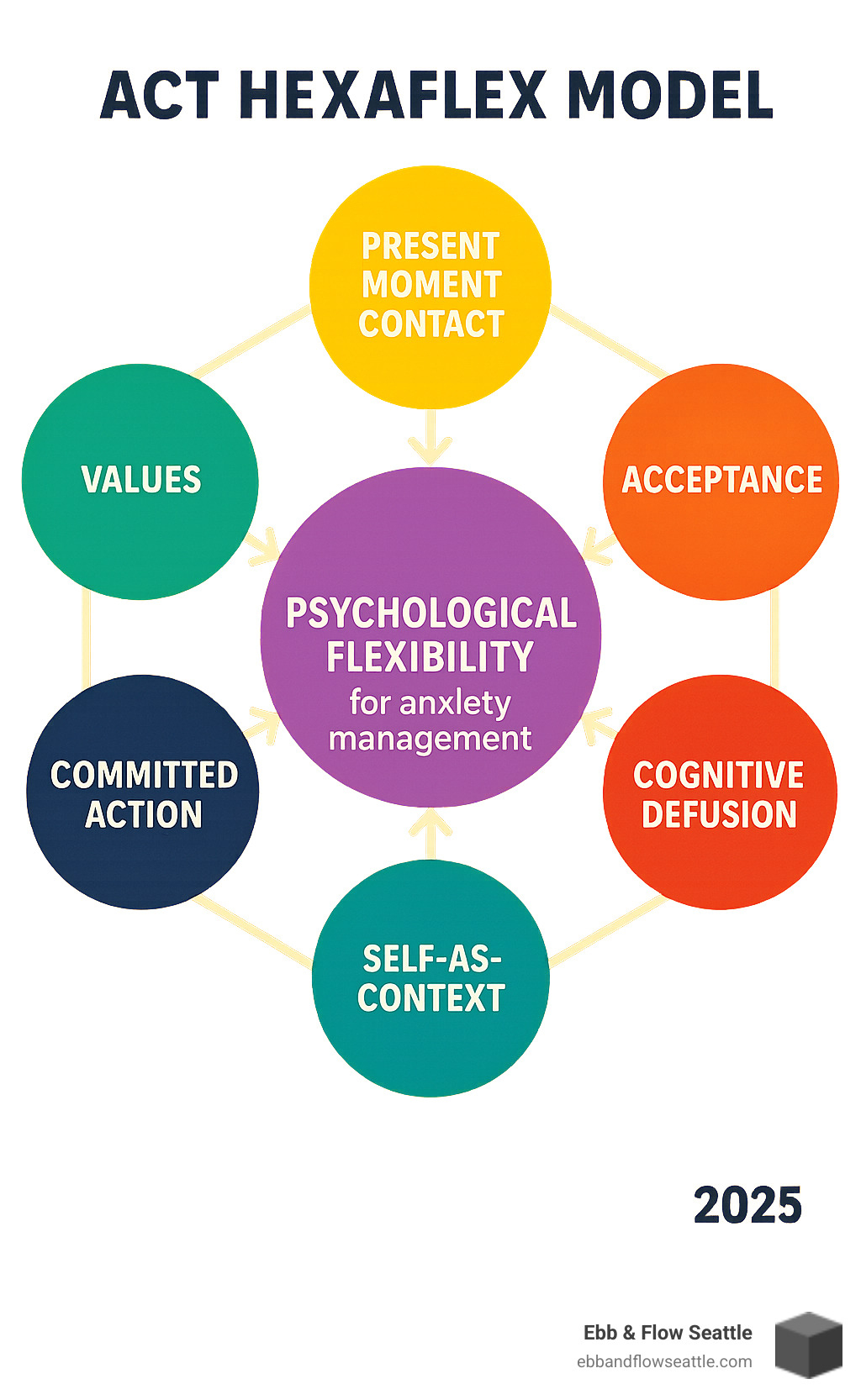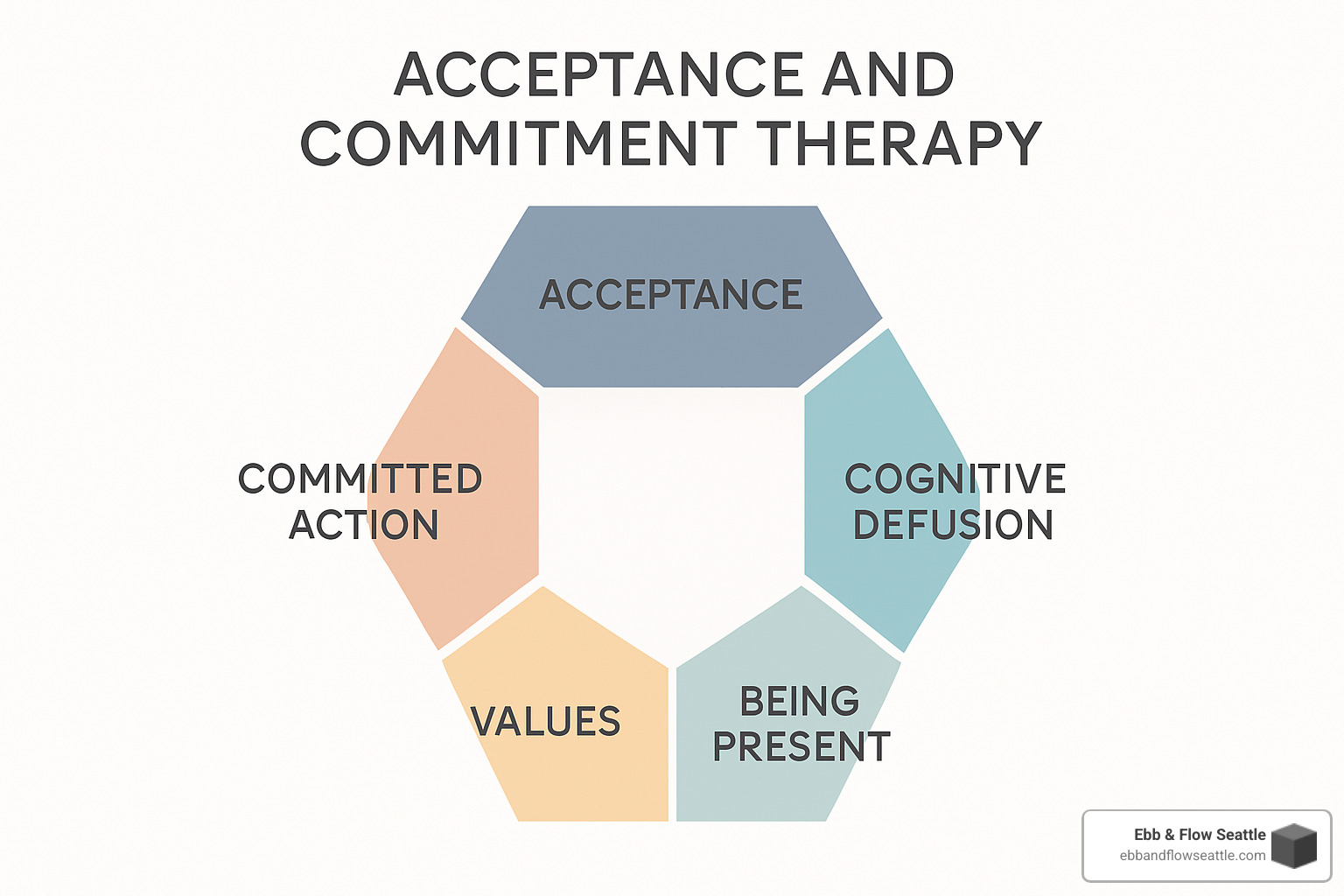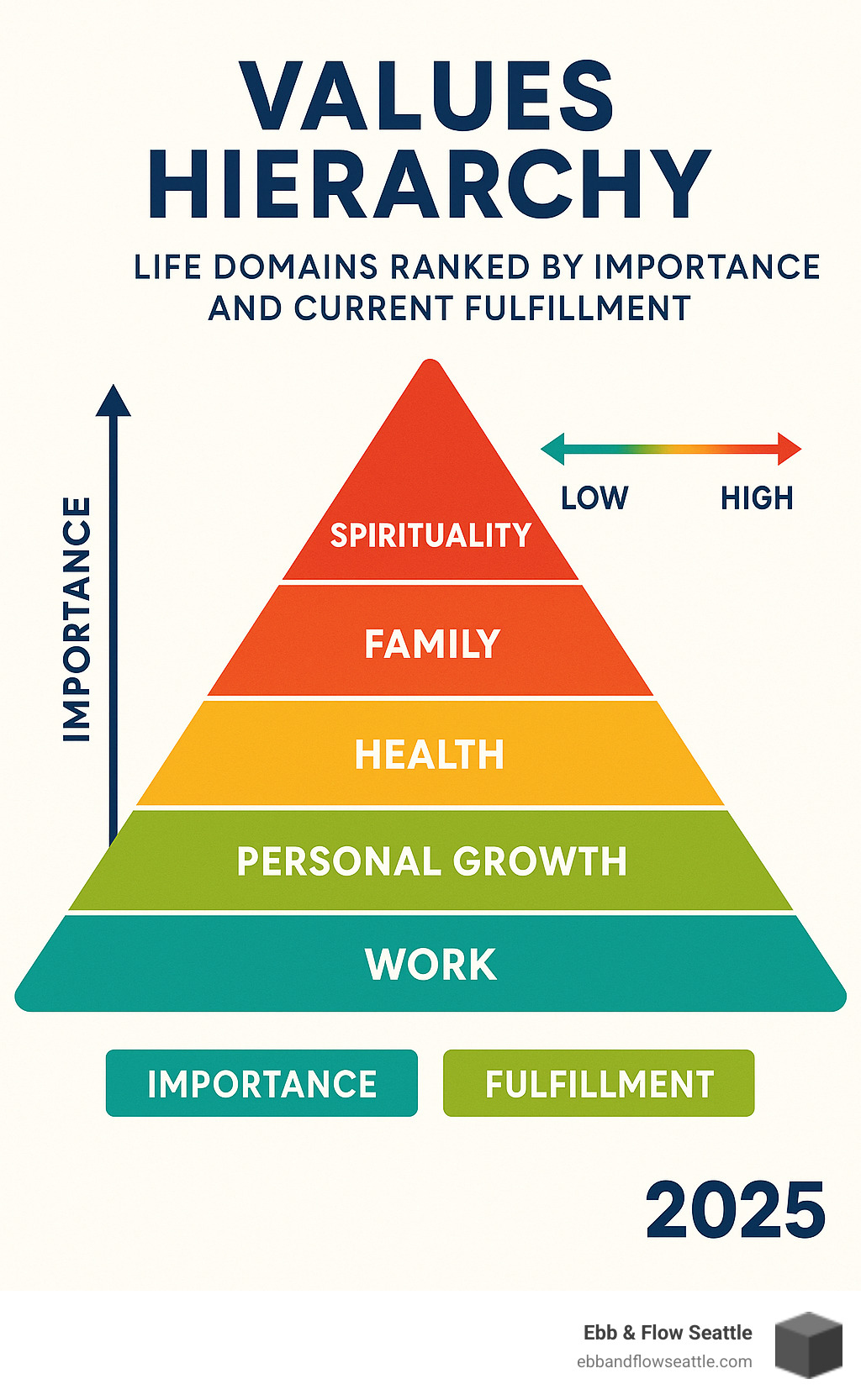Mind Over Chatter – ACT Interventions for Anxiety That Actually Work

If you're tired of being told to "just think positive" or "breathe through it" while your mind runs wild with worry, you're in the right place. I'm here to share something different – Acceptance and Commitment Therapy interventions that actually help you build psychological flexibility and a meaningful life alongside your anxiety, not in spite of it.
As someone who specializes in working with women in Lynnwood and beyond, I see the same patterns over and over: brilliant, sensitive souls who've learned to be the "good girl," who've mastered the art of over-functioning, and who are absolutely exhausted from trying to control every anxious thought that pops up. If that sounds like you, keep reading.
Why Traditional Anxiety Approaches Leave You Feeling Stuck
At Ebb and Flow Nutrition and Mental Health Counseling, here's what I've learned after years of working with women who are fed up with surface-level solutions: most anxiety treatments focus on symptom management rather than actually helping you live the life you want. They teach you to wage war against your own mind through outdated therapy techniques, and honestly? That's exhausting.
Acceptance and Commitment Therapy interventions work differently. Instead of trying to eliminate anxiety (spoiler alert: that's impossible), we learn to change your relationship with it using evidence-based commitment therapy techniques. Think of it like this – anxiety isn't the enemy. It's information. Sometimes it's useful information, sometimes it's your mind being overprotective, but either way, fighting it just creates more suffering.
I work with women who are tired of living small because anxiety calls the shots. You know who you are – you've probably been the responsible one since you were little, the one everyone could count on, the one who kept it all together even when you were falling apart inside. You've learned to push through, to ignore your own needs, to say yes when you mean no.
And now? You're anxious, dysregulated, and probably don't even know what you actually want anymore because you've been so busy managing everyone else's needs and expectations through various control strategies that keep you disconnected from your authentic self.

What Actually Is Acceptance and Commitment Therapy?
Acceptance and Commitment Therapy isn't your typical therapy approach, and I'm not your typical therapist. I developed my practice around helping women who've lost themselves in the chaos of trying to be everything to everyone. Commitment therapy gives us a framework to find your way back to yourself through building psychological flexibility.
The core principle is this: psychological flexibility. That's the ability to stay present with your experience – even when it's uncomfortable – while taking action based on what truly matters to you. Not what your anxiety tells you to do. Not what others expect of you. What actually matters to YOU.
Acceptance and Commitment Therapy is part of what researchers call third wave therapies, which focus on changing your relationship with thoughts and feelings rather than changing the thoughts themselves. These behavioral therapies emphasize acceptance, mindfulness, and values-based living.
ACT operates on six core processes that work together like a beautiful dance:
Present-Moment Contact: Learning to come home to right now instead of living in anxiety's favorite playground – the future that hasn't happened yet. This here and now experience grounds you in reality rather than painful thoughts about what might happen.
Acceptance: Making space for difficult feelings and difficult emotions without the exhausting struggle. This doesn't mean giving up or being passive. It means stopping the war with your own emotions and reducing experiential avoidance.
Cognitive Defusion: Getting some distance from the anxious chatter in your mind. Your thoughts are not facts, even when they feel incredibly real and urgent. These commitment therapy techniques help you see unwanted thoughts as just mental events passing through your awareness.
Self-as-Context: Developing the part of you that can observe your experience with compassion. You are not your anxiety. You are the one experiencing it, the sky that holds all weather.
Values Clarification: Reconnecting with what truly matters to you – not what you think should matter, not what others want for you, but what lights you up from the inside. These personal values become your life directions.
Committed Action: Taking meaningful steps toward your values, even when anxiety is along for the ride. This is where psychological flexibility transforms into real change.
The Science Behind Why Acceptance and Commitment Therapy Works for Anxiety
Let me get nerdy for a minute because the research is genuinely exciting. The six core processes of Acceptance and Commitment Therapy have been studied extensively, with research shows that these ACT interventions target the root issue: our struggle with internal experiences and experiential avoidance strategies.
Most of my clients come to me having tried everything – meditation apps, breathing exercises, positive thinking, you name it. These aren't bad things, but they often miss the point. The problem isn't that you have anxiety. The problem is how much energy you're spending trying to control it through ineffective control strategies.
Research shows that when we stop fighting our internal experiences and start building psychological flexibility through commitment therapy techniques, we don't just feel better – we live better. We make choices based on our deepest values rather than our fears. We take committed action even when we're scared. We show up as ourselves instead of who we think we should be.
Mental health research consistently demonstrates that Acceptance and Commitment Therapy helps people develop mindfulness skills, reduce experiential avoidance, and create a rich and meaningful life. The ACT processes work together to address not just mental health concerns, but overall well-being of the whole person.

My Approach: Real Talk About Mental Health and Anxiety Recovery
I'm going to be honest with you because that's how I work with all my clients. Anxiety recovery isn't about becoming someone who never feels anxious. It's about becoming someone who can feel anxiety and still live authentically using evidence-based therapy techniques.
In my practice, I blend evidence-based commitment therapy techniques with intuitive healing approaches because I believe in treating the whole person – mind, body, and spirit. I've found that women who've spent years disconnected from their intuition need both practical ACT interventions and spiritual reconnection.
I work with women dealing with anxiety, binge eating disorder, substance abuse, and recovery from narcissistic abuse. What these mental health conditions often have in common is a pattern of disconnection from your authentic self and over-reliance on external validation or ineffective control strategies that maintain experiential avoidance.
The six core processes of Acceptance and Commitment Therapy provide a comprehensive framework for addressing these interconnected issues while building psychological flexibility and supporting both mental and physical health.
Core Commitment Therapy Techniques I Use in My Practice
Present-Moment Grounding Through ACT Interventions
When anxiety pulls you into the future catastrophe theater, I teach simple but powerful grounding commitment therapy techniques. My favorite is what I call "anchor breathing" – not because breathing cures anxiety, but because it brings you back to your body and the present moment experience.
Try this mindfulness exercise: Place one hand on your chest, one on your belly. Notice the physical sensation of breathing without trying to change anything. When your mind wanders to the "what-ifs" (and it will), gently guide your attention back to the sensations in your body. This simple practice helps you develop mindfulness skills while reducing experiential avoidance.
The 5-4-3-2-1 technique is another powerful ACT intervention I love: Notice 5 things you can see, 4 you can touch, 3 you can hear, 2 you can smell, and 1 you can taste. This isn't about stopping anxiety – it's about remembering that you exist in this moment, not in your painful thoughts about the future.
Cognitive Defusion: Getting Unstuck from Negative Thoughts
This is where we get a little playful with your mind's tendency to catastrophize using specific commitment therapy techniques. Instead of fighting unwanted thoughts like "I'm going to mess this up" or "Everyone will judge me," we learn to see them as mental events rather than truths through cognitive defusion practices.
One technique I teach is "Thank your mind" – literally saying "Thanks, mind, for that thought" when anxiety serves up scary predictions. It sounds simple, but it creates just enough space between you and the thought to remember that you have choices. You might even say "such an interesting thought" to create even more distance.
Another approach is the "Radio Doom and Gloom" exercise, one of my favorite ACT interventions. Imagine your negative thoughts and painful thoughts as a radio station you can tune in and out of. You can't control what's playing, but you can choose how much attention to give it. These cognitive defusion techniques help you see thoughts as "just words" rather than absolute truths.
Values-Based Living: Your North Star Through Commitment Therapy
This is where the real transformation happens using the core processes of Acceptance and Commitment Therapy. Most of my clients have become so focused on avoiding anxiety through experiential avoidance that they've lost touch with their personal values. We spend significant time clarifying your deepest values – not goals you can check off, but ongoing life directions for how you want to show up in the world.
I use a values exercise where we imagine you're 90 years old, looking back on your meaningful life. What would you want to say about how you lived? What relationships mattered? How did you handle challenges? What impact did you have? This commitment therapy technique helps you reconnect with what truly matters.
These personal values become your compass through all the ACT processes. When anxiety tells you to stay small, avoid the presentation, skip the social gathering, or people-please your way through another situation, you can ask: "What would I do here if I were living according to my deepest values?"
Committed Action: Moving Toward What Matters Through ACT Interventions
Values without action are just nice ideas. This is where we break down meaningful goals into doable steps using commitment therapy techniques and learn to take committed action even when anxiety is present.
I work with clients to identify specific, values-based actions they can take this week, today, even in the next hour. Maybe it's setting a boundary with someone who drains your energy. Maybe it's pursuing a creative project that lights you up. Maybe it's having an authentic conversation instead of staying surface-level.
The key is that you're choosing these actions based on your personal values, not based on what will minimize your anxiety. Sometimes values-based committed action actually increases anxiety in the short term – and that's okay. The six core processes of Acceptance and Commitment Therapy teach us that feeling anxious doesn't disqualify you from living meaningfully.

Working Through Common Obstacles Using ACT Processes
"But I Can't Just Accept Anxiety – It Feels Too Overwhelming"
I hear this a lot, and it makes complete sense. Acceptance through commitment therapy doesn't mean resignation or giving up. It means stopping the extra layer of suffering that comes from fighting your feelings through experiential avoidance strategies.
Think of it this way: if you're already feeling anxious (which you can't control), and then you add frustration, shame, and fear about being anxious (which you can control), you've just doubled your suffering. The acceptance process in ACT interventions is about dropping that second layer while building psychological flexibility.
"My Mind Won't Stop Racing – I Can't Do These Therapy Techniques"
Perfect. You don't need a quiet mind to practice these commitment therapy techniques. The goal isn't to stop negative thoughts – it's to change your relationship with unwanted thoughts through cognitive defusion and other ACT processes.
Start small with simple mindfulness exercises. Notice one breath. Observe one painful thought without buying into it. The practice is in noticing when your mind wanders and gently returning to the present moment experience, not in having a peaceful mind. These mindfulness skills develop over time through consistent practice of ACT interventions.
"I Don't Know What My Personal Values Are"
This is incredibly common, especially for women who've spent years focused on others' needs through various control strategies and experiential avoidance. We start slowly with commitment therapy techniques, often by identifying what you don't want first, then moving toward what you do want.
I might ask: When do you feel most like yourself? What activities make you lose track of time? What injustices in the world upset you most? These clues point toward your deepest values and help guide the other core processes of Acceptance and Commitment Therapy.
Specialized Applications for Women's Mental Health
Anxiety and People-Pleasing Through ACT Interventions
Many of my clients struggle with anxiety that's deeply connected to their need to keep everyone else happy through learned control strategies. We use commitment therapy techniques to help you distinguish between being kind and being controlled by others' potential reactions while building psychological flexibility.
This might involve practicing saying no without elaborate explanations, setting boundaries even when others are disappointed, or choosing authenticity over harmony. The six core processes help you move away from experiential avoidance toward values-based living.
Binge Eating and Emotional Regulation Using Commitment Therapy
Acceptance and Commitment Therapy is incredibly effective for binge eating because it addresses the underlying pattern of using food to avoid difficult emotions through experiential avoidance strategies. We work on building tolerance for difficult feelings while taking committed action toward health and self-care.
Instead of focusing on food rules or restriction, we focus on personal values like self-respect, health, and body wisdom through ACT interventions. What would you eat if you were honoring your body? How would you move if you were caring for yourself? These commitment therapy techniques help you develop a healthier relationship with food and your body.
Substance Abuse Recovery Through ACT Processes
Women recovering from substance abuse often struggle with tolerating difficult emotions without numbing or escaping. The core processes of Acceptance and Commitment Therapy provide powerful tools for building psychological flexibility while staying connected to your deepest values.
We work on recognizing cravings and urges as temporary experiences that don't require action, using cognitive defusion to unhook from thoughts like "I need this to cope," and taking committed action toward the meaningful life you want to create. These therapy techniques address both the mental health and physical health aspects of recovery.
Recovery from Narcissistic Abuse Using Commitment Therapy Techniques
Women recovering from narcissistic relationships often struggle with trusting their own perceptions and making decisions based on their personal values rather than fear. ACT interventions help rebuild that internal compass while addressing the complex trauma that affects both mental and physical health.
We work on recognizing your own emotional responses as valid information, setting boundaries based on your deepest values rather than what might prevent conflict, and taking committed action toward the meaningful life you want rather than staying small to avoid attention. The six processes of Acceptance and Commitment Therapy provide a comprehensive framework for healing.

Building Your Personal Practice with ACT Interventions
Daily Mindfulness Moments Through Commitment Therapy
I don't expect my clients to meditate for hours. Instead, we find small moments throughout the day to practice present-moment contact and other mindfulness skills. This might be noticing the sensation of water on your hands while washing dishes, taking three conscious breaths before checking your phone, or doing a quick body scan while your coffee brews.
These simple ACT interventions help you build psychological flexibility gradually while integrating the core processes into your daily life. Each moment of mindfulness strengthens your ability to stay present with difficult emotions rather than engaging in experiential avoidance.
Weekly Values Check-ins Using ACT Processes
Every week, I encourage clients to ask themselves: "How well did I live according to my personal values this week? Where did anxiety or old control strategies pull me off course? What's one small way I can align more closely with my deepest values?"
This regular practice of the values process helps you stay connected to what matters most while building psychological flexibility. It's not about perfection – it's about awareness and gentle course correction using commitment therapy techniques.
Monthly Committed Action Planning Through Acceptance and Commitment Therapy
Once a month, we look at bigger picture goals and break them down into values-based actions using the six core processes. This isn't about productivity or achievement – it's about living according to what truly matters to you while building a rich and meaningful life.
We identify potential obstacles (including difficult emotions and negative thoughts) and develop strategies using ACT interventions to work through them. This planning process helps you take committed action even when anxiety shows up.
The Spiritual Dimension of Mental Health Healing
I believe healing happens on multiple levels – mind, body, and spirit. Many of my clients have lost connection with their intuition and inner wisdom through years of anxiety and over-functioning using ineffective control strategies.
In my practice, we honor the spiritual aspects of mental health while staying grounded in evidence-based commitment therapy techniques. This might involve exploring what your anxiety is trying to protect, connecting with your inner wisdom through mindfulness exercises, or recognizing the ways your sensitivity is actually a gift in a world that often feels harsh.
The self-as-context process in Acceptance and Commitment Therapy naturally incorporates this spiritual dimension, helping you connect with the part of yourself that observes your experience with compassion and wisdom. This supports both mental and physical health while addressing your overall well-being as the whole person you are.

What to Expect in Working Together Using ACT Interventions
Initial Consultation
I offer a free consultation where we can connect and see if we're a good fit. I believe the therapeutic relationship is sacred, and it's important that you feel seen and understood from the beginning as we explore how commitment therapy might support your mental health goals.
Getting Started with Commitment Therapy Techniques
After our consultation, I'll help you get set up in my client portal and we'll schedule your intake session. This initial session is longer than our regular meetings – it gives us time to understand your story, identify your personal values, and start building the foundation for our work together using the core processes of Acceptance and Commitment Therapy.
Ongoing Sessions Using ACT Processes
I believe in consistency, so we'll establish a regular day and time for your sessions that works for your schedule. I typically schedule in three-month blocks to provide stability and predictability in your healing journey while we work through the six core processes.
Some weeks we might dive deep into processing difficult emotions and painful thoughts. Other weeks might be more skills-focused, practicing specific ACT interventions and commitment therapy techniques. I might give you gentle homework between sessions – nothing overwhelming, but small practices that help you integrate what we're learning and build psychological flexibility.
Beyond Traditional Therapy: Group Treatment and Specialized Services
I also offer intensive sessions for deeper work, women's group therapy for connecting with others on similar journeys, and specialized groups for binge eating recovery. Each option provides different ways to build psychological flexibility and practice the core processes of Acceptance and Commitment Therapy in community.
Group treatment can be particularly powerful for practicing mindfulness skills and values clarification with others who understand your journey toward mental health and a meaningful life.

Making the Decision to Heal Through Acceptance and Commitment Therapy
If you've read this far, something is resonating. Maybe you're tired of anxiety running your life through endless control strategies. Maybe you're ready to stop being the "good girl" and start being yourself. Maybe you're curious about what it would feel like to make decisions based on your deepest values rather than your fears.
ACT interventions and commitment therapy techniques aren't magic – they require practice and commitment. But they offer something that symptom-focused therapy techniques often miss: a path back to yourself. Not the version of yourself that anxiety approves of, but your authentic, whole, imperfect, beautiful self.
You don't have to have it all figured out to start exploring the six core processes. You don't need to be "ready" or have conquered your anxiety first. You just need to be willing to try something different, to be curious about your experience instead of fighting it through experiential avoidance, and to take small steps toward what matters to you.
In my work with women throughout Lynnwood and online, I've seen incredible transformations happen when someone decides to stop managing their anxiety and starts living their personal values through commitment therapy. It's not about becoming fearless – it's about becoming whole while building psychological flexibility.
Your anxiety doesn't disqualify you from living a rich and meaningful life. In fact, it might be pointing you toward what matters most. The question isn't how to eliminate difficult emotions – it's how to live fully in spite of them, or maybe even because of them, using the powerful tools of Acceptance and Commitment Therapy.
The core processes teach us that feeling anxious doesn't mean you can't take committed action. The six processes work together to help you build a fulfilling life where difficult feelings are welcome guests rather than unwanted intruders you must fight through control strategies.
Ready to explore what ACT interventions and commitment therapy techniques might look like in your life? I'd love to connect with you about your unique journey toward psychological flexibility and authentic living. Contact me for more information about mental health support through Acceptance and Commitment Therapy, and let's discuss how we can work together to help you move from surviving to thriving while building the meaningful life you deserve.
